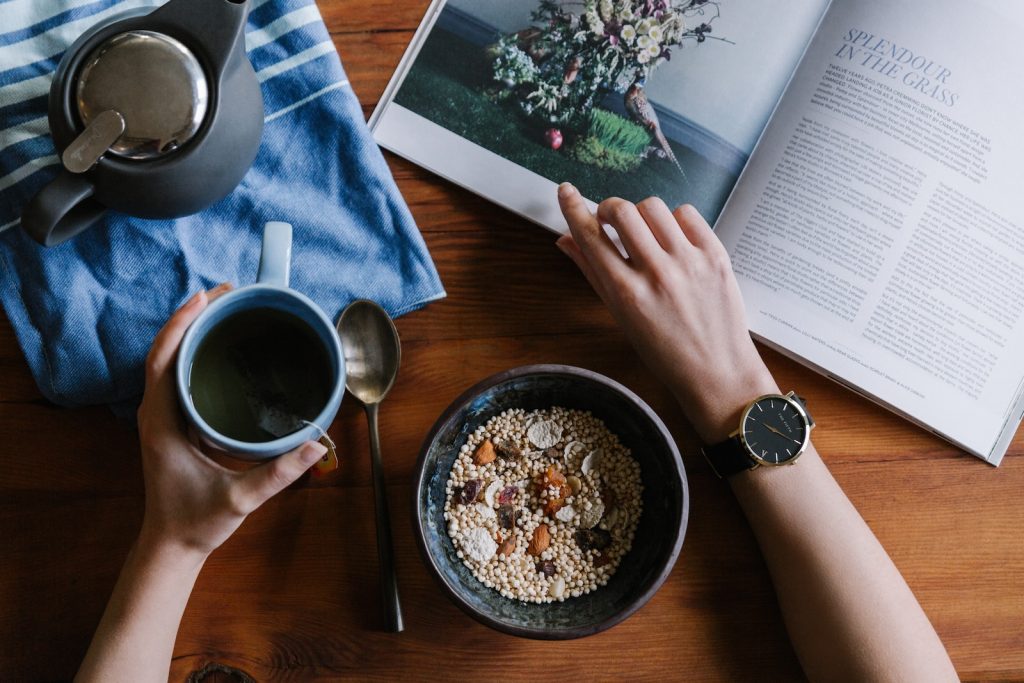Making small changes in our eating habits can have a huge impact on our health. If we are conscious of what, when and how much we eat, we can improve our overall health in the long run. Here are some simple eating habits you can implement in your everyday regime for a healthier lifestyle.
1. Eat Plant-Based Foods
It is essential to incorporate more plant-based foods into our diets as they are rich in fiber, vitamins and minerals. Eat more vegetables, whole grains, legumes and fruits in your meals for a healthy balanced diet.
2.Control Portion Sizes
Overeating can be harmful to our health and cause excessive weight gain. So it is important to include only the recommended portion sizes in every meal to avoid overconsumption.
3. Drink Plenty of Water
Staying hydrated is an essential part of a balanced diet. Make sure to drink 8-10 glasses of water daily to stay healthy. This will also help keep hunger pangs away.
4. Avoid Processed Foods
Processed foods usually contain excessive amounts of salt, fat and sugar. Try to avoid them and opt for natural, unprocessed foods such as fruits and vegetables instead.
5. Don’t Skip Meals
It is important to have breakfast, lunch and dinner every day and make sure to have healthy meals. Skipping meals can make us tired and weak, hence avoid doing so.
6. Read Nutrition Labels
When purchasing food items, take a moment to read the nutrition label. Doing this will help ensure that you make healthy and nutritious choices for your meals.
7. Eat Slowly
It is important to take your time when eating. Chew food slowly and enjoy it. Eating slowly also helps to avoid overeating.
8. Get Enough Sleep
One of the most important steps for a good lifestyle is to get enough sleep. Take 6-8 hours of sleep every night to stay healthy and energized.
9. Stock Your Kitchen with Healthy Foods
None of these tips will work if your kitchen is stocked with unhealthy and processed food. So it is best to fill your grocery cart with fresh fruits and vegetables, whole grains and lean proteins.
10. Avoid Eating Late at Night
Eating late at night can be harmful to our bodies. So it is best to have dinner at least two to three hours before going to sleep.
11. Cut Down on Sugar and Salt Intake
Excessive consumption of salt and sugar can be very harmful to our health. So try to limit the use of these ingredients in your meals and opt for natural, unprocessed foods instead.
12. Plan Your Meals
Planning your meals ahead of time can help you make healthier food choices. Knowing what and when to eat will make it easier for you to stick to your healthy eating plan.
13. Avoid Unhealthy Drinks
Beverages with high sugar content such as sodas, energy drinks, and sweetened juice should be avoided. Instead, opt for healthy alternatives such as plain water, coconut water, skimmed milk, green tea etc.
14. Include Protein in your Diet
Including enough protein rich-foods into your meals is important for a good lifestyle. Protein rich foods are salads, legumes, lean meats and fish.
15. Eat at Regular Intervals
Having meals at regular intervals helps to keep our metabolism functioning properly. So don’t miss breakfast, lunch or dinner and have healthy meals at regular intervals.
16. Have Balanced Meals
Each meal should include balanced amounts of carbohydrates, proteins, fats, vitamins and minerals. Having a balanced diet is key to staying healthy and fit in the long run.
17. Avoid Emotional Eating
Many of us have the habit of eating when we are stressed or emotional. Eating in response to emotions can lead to unhealthy habits in the long run. Make sure to be aware of why and when you are eating.
18.Eat More Fruits and Vegetables
Fruits and vegetables are rich in fiber and vitamins. Avoid processed snacks and opt for natural, fresh fruits and vegetables instead.
Final Thoughts
Incorporating these simple eating habits in our everyday routines can make a great impact on our health in the long run. Eating healthy will help you have more energy, stay fit and boost your overall health.
Frequently Asked Questions
Q1. How many glasses of water should we drink in a day?
A1. It is recommended to drink 8-10 glasses of water daily for a healthy lifestyle.
Q2. What are the best foods to eat for a balanced diet?
A2. The best foods for a balanced diet are whole grains, legumes, fresh fruits and vegetables, lean proteins and healthy fats.
Q3. Is it important to include enough protein in our diets?
A3. Yes, including enough protein rich-foods in your diet is important for a good lifestyle. Protein rich foods are salads, legumes, lean meats and fish.
Q4. How can I make sure I am eating the right portion sizes?
A4. It is important to stick to the recommended portion sizes in every meal in order to avoid overeating.
Q5. What kinds of drinks should we avoid?
A5. Beverages with high sugar content such as sodas, energy drinks, and sweetened juice should be avoided.
Q6. Should we plan our meals ahead to make healthy food choices?
A6. Yes, planning your meals ahead of time can help you make healthier food choices. Knowing what and when to eat will make it easier for you to stick to your healthy eating plan.
Q7. How many hours of sleep should we get every night?
A7. It is recommended to get six to eight hours of sleep every night for a healthy lifestyle.
Q8. Is it ok to eat late at night?
A8. It is not recommended to eat late at night as it can be harmful to our bodies. Try to have dinner at least two to three hours before going to sleep.
Q9. Should we avoid emotions when it comes to eating?
A9. Yes, it is important to avoid eating when we are stressed or emotional. Eating in response to emotions can lead to unhealthy habits in the long run.
Q10. Is it important to stock our kitchen with healthy foods?
A10. Yes, it is important to fill your grocery cart with fresh fruits and vegetables, whole grains and lean proteins. This will help you make healthier food choices.



